Ideal for curved surfaces and stealth camping, these panels offer a level of versatility that rigid panels can’t match.
However, it’s crucial to note that they generally don’t perform at the same efficiency level as their rigid counterparts. In this guide, we’ll explore the nuances that differentiate the top flexible solar panels, using data and real user experiences to guide you.
Disclaimer: I have not used these products personally. I checked them online and wrote my conclusion by looking at their pecs and available customer reviews.
| Best Choice
Renogy 100W |
Best Alternative
ExpertPower 100W |
Best Budget
Topsolar 100W |
|
|---|---|---|---|
| Image | 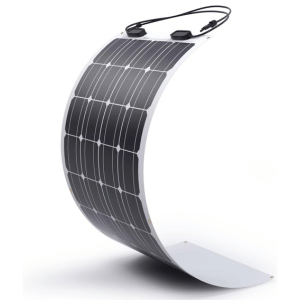 |
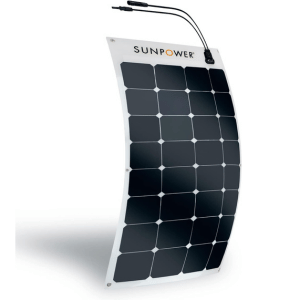 |
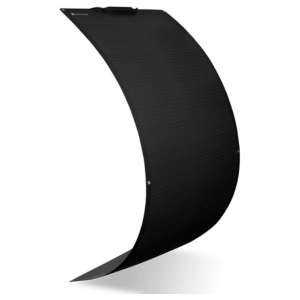 |
| Efficiency | 21% | 22-25% | Not Specified |
| Weight | 4 lbs | 4.4 lbs | 4.2 lbs |
| Dimensions (LxWxH) | 47.9 x 21 x 0.08 in | 45.9 x 21.9 x 0.8 in | 45.28 x 25.59 x 1.38 in |
| Warranty | 5-year material and workmanship | 5-year power, 2-year product | Not Specified |
| Flexibility | Up to 248 degrees | Up to 30 degrees | Minimum radius of 40cm |
| User Reviews | 4.5/5 | 4.4/5 | 3.9 /5 |
| Link |
1. Renogy 100W Flexible Solar Panel
The Renogy 100W Flexible Solar Panel is a revolutionary product that brings many benefits to the table. Its extreme flexibility makes it perfect for mounting on curved surfaces like an RV or boat roof. The panel is ultra-lightweight and super thin, making transportation and installation a breeze. Moreover, it’s highly durable and capable of withstanding extreme weather conditions.
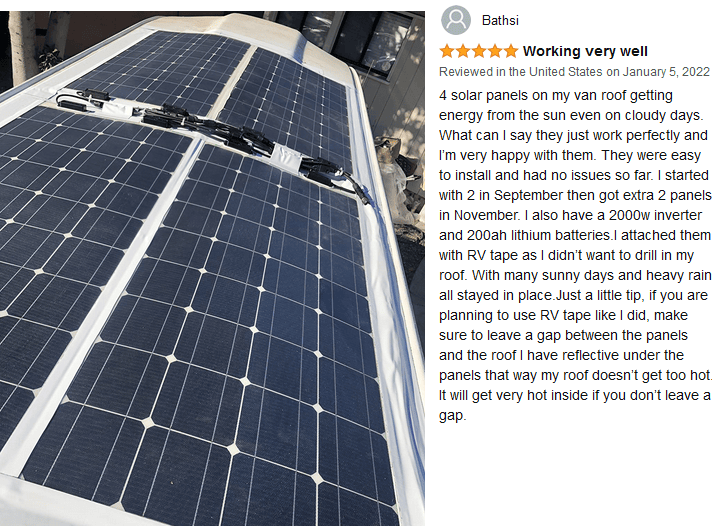
Pros and Cons
- Extreme Flexibility: Can be mounted on a variety of curved surfaces.
- Ultra-Lightweight: Weighs 70% less than conventional panels.
- High Durability: Can withstand wind speeds up to 2400 Pa and snow loads up to 5400 Pa.
- Lower Power Output: Some users reported lower power output than advertised.
- Short Positive Cables: The design includes short positive cables, which may require an extension.
- Price: Higher upfront cost compared to rigid panels.
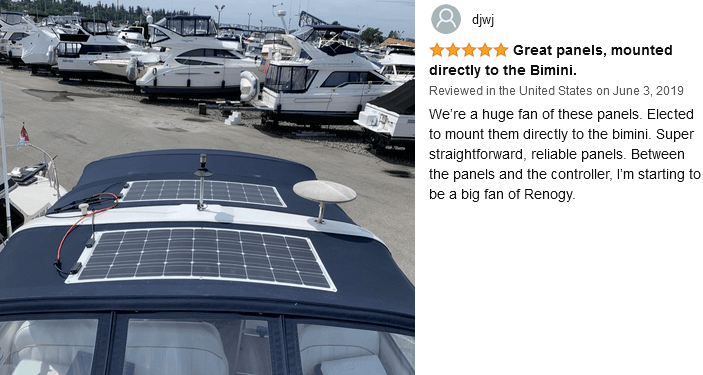
Summary
The Renogy 100W Flexible Solar Panel is an excellent choice for a versatile and lightweight solar energy solution. Its advanced polymer materials and super-thin lamination make it a standout product in the flexible solar panel market. However, be prepared to invest in extension cables and possibly accept a slightly lower power output.
User Experience Based on Reviews
FrankOfAmerica mentioned that he has been using four of these 100W panels on his camper roof for four years with little to no degradation. He also praised the panel’s durability and ease of installation.
A Guy Named Jeff found the panel very convenient when paired with his Jackery 500. However, he noted that the panel’s power input to the Jackery was less than the advertised figure.
Barbara Loney appreciated the lightweight design and the panel’s ability to charge her Goal Zero Yeti 1000 solar generator efficiently. She also praised Renogy’s customer service.
2. ExpertPower 100W Flexible Solar Panel
The ExpertPower 100W Flexible Solar Panel is a top-tier product that offers high efficiency and durability. Made with Maxeon Monocrystalline solar cells, this panel boasts an industry-leading efficiency of 22-25%. It’s incredibly lightweight at just 4.4 pounds and can flex up to 30 degrees, making it ideal for RVs, boats, and camping trips.
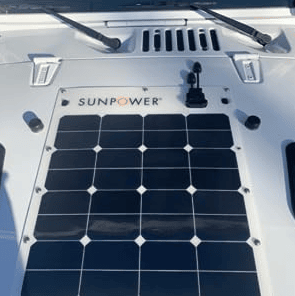
Pros and Cons
- High Efficiency: With an efficiency rate of 22-25%, this panel is one of the most efficient in its class.
- Durability: Built on a solid copper foundation, it’s resistant to cracking and corrosion.
- Easy Installation: Comes with MC4 cable connectors and pre-drilled holes for hassle-free installation.
- Vendor Responsiveness: Some users reported that the vendor did not respond to queries about damaged products.
- Price: Higher upfront cost due to its high efficiency and durability.
- Limited Warranty: While it has a 5-year power warranty, the product warranty is only for 2 years.
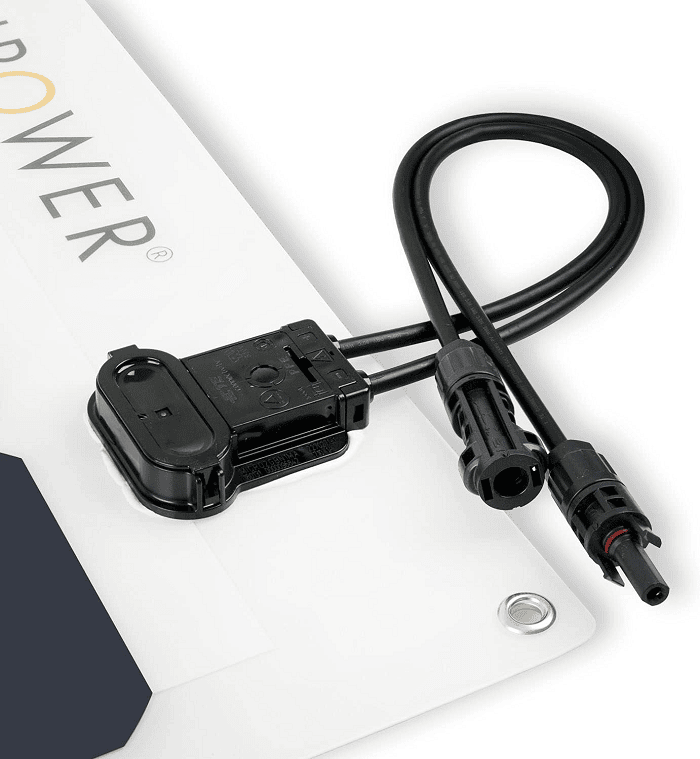
Summary
The ExpertPower 100W Flexible Solar Panel is an excellent choice for those who prioritize efficiency and durability. Its high-efficiency Maxeon Monocrystalline solar cells set it apart from competitors. However, be cautious about the vendor’s customer service and consider the limited product warranty.
User Experience Based on Reviews
ObsidianFlow praised the panel’s lightweight design but expressed concerns about receiving a panel with deep scratches.
Scott Taylor was impressed with the panel’s output through his Renogy Wanderer solar controller, confirming its high efficiency.
Klaus Weston compared it to other flexible solar panels and found that ExpertPower’s panel consistently delivered higher wattage, making it worth the extra investment.
Watts Family was highly impressed with the panel’s output, stating that it almost reached the Standard Test Conditions (STC) output, which is rare for flexible panels.
3. Topsolar Flexible Solar Panel
The Topsolar Flexible Solar Panel 100W is a versatile and efficient solution for your off-grid energy needs. With its monocrystalline solar cells, this panel offers high conversion efficiency, making it a reliable power source. It’s incredibly lightweight at just 3.97 pounds and has a unique bendable design, allowing it to fit on a variety of uneven surfaces like RVs, boats, and tents.
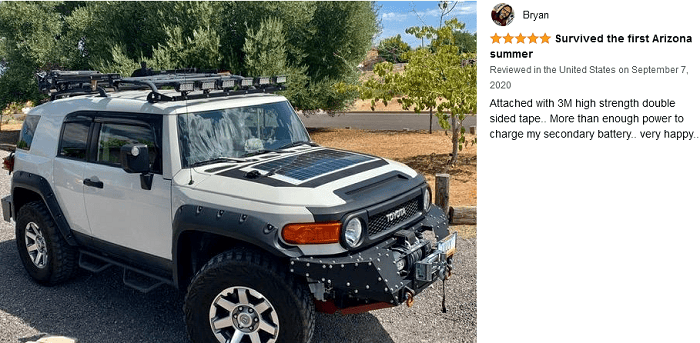
Pros and Cons
- High Conversion Efficiency: Utilizing monocrystalline solar cells and unique back contact technology, this panel offers up to 50% more efficiency compared to standard panels.
- Flexible Design: With a minimum bend radius of 40cm, this panel can be installed on irregular surfaces, offering unparalleled flexibility in setup.
- Quality Material: Made of ETFE material, this panel promises higher light transmittance and a longer lifespan, ensuring you get the most out of your investment.
- Additional Controller Required: To protect your battery, you’ll need to purchase a separate controller, adding to the overall cost.
- Mixed Customer Reviews: While generally well-received, the panel has a 3.9-star rating, indicating some room for improvement.
- Weight: Although lightweight, it’s not the lightest option available in the market, which could be a consideration for some users.
Summary
The Topsolar Flexible Solar Panel 100W is a solid choice for those looking for a versatile and efficient solar panel. Its high conversion efficiency and flexible design make it stand out from the competition. However, be prepared for the additional cost of a controller and weigh your options carefully due to its mixed customer reviews.
User Experience Based on Reviews
- Kristian Skarsfeldt: Kristian, who lives in sunny Tucson, was particularly impressed with the panel’s charging capabilities. He reported a consistent 53W output at 2 pm, which is noteworthy for a 100W panel under real-world conditions.
- Michael See: Michael highlighted the panel’s lightweight advantage, stating that a whole kilowatt of these 100-watt panels weighs only 40 pounds. He found it perfect for stealth arrays and portable uses like camping.
- lytefast: On the downside, lytefast pointed out that the sealant for the junction box was sloppy, and the panel only produced 30W in California mornings, suggesting some quality control issues.
By offering a blend of high efficiency, flexibility, and quality material, the Topsolar Flexible Solar Panel 100W proves to be a reliable choice for your off-grid energy needs. Whether you’re an outdoor enthusiast or simply looking to adopt a more sustainable lifestyle, this panel offers a compelling mix of features that make it worth considering.
Buying Guide for Flexible Solar Panels
When it comes to choosing a flexible solar panel, there are several factors you should consider to ensure you’re making an informed decision. Here’s a comprehensive buying guide to help you navigate through the options:
Efficiency
The efficiency of a solar panel refers to how well it converts sunlight into electricity. Higher efficiency means you’ll need fewer panels to generate the same amount of power. Look for panels with an efficiency rate above 20% for optimal performance.
Material
Flexible solar panels are generally made from monocrystalline, polycrystalline, or thin-film cells. Monocrystalline cells offer the highest efficiency but come at a higher cost. Polycrystalline cells are less efficient but more affordable. Thin-film cells offer the most flexibility but are the least efficient.
Weight and Size
Consider the weight and dimensions of the panel, especially if you plan to use it for mobile applications like RVs, boats, or camping. Lighter and more compact panels are easier to install and transport.
Durability
Look for panels made from durable materials like ETFE to ensure a longer lifespan. Check if the panel is waterproof, UV-resistant, and capable of withstanding various weather conditions.
Flexibility
The bend radius of the panel can be crucial if you plan to install it on uneven or curved surfaces. A lower minimum bend radius allows for more flexible installation options.
Additional Features
Some panels come with extra features like built-in USB ports, charge controllers, or junction boxes. While these can add convenience, they may also add to the cost.
Warranty and Customer Support
Always check the warranty period and what it covers. A longer warranty period is generally an indicator of the manufacturer’s confidence in the product. Also, consider the quality of customer support, as you may need assistance during installation or troubleshooting.
Price
Finally, consider your budget. While it may be tempting to go for the cheapest option, remember that you often get what you pay for. It’s usually worth investing a bit more upfront for a high-quality, efficient panel that will save you money in the long run.
By considering these factors, you’ll be better equipped to choose a flexible solar panel that meets your specific needs and preferences. Whether it’s the Topsolar Flexible Solar Panel 100W or another model, make sure to weigh the pros and cons carefully to make an informed decision. Happy shopping!
Frequently Asked Questions
Are flexible solar panels worth it?
Flexible solar panels offer a unique set of advantages that make them worth considering for specific applications. They are lightweight, easy to install, and can be mounted on irregular or curved surfaces like RV roofs, boats, and tents. However, their efficiency and durability can sometimes be lower than traditional rigid panels. If flexibility, weight, and ease of installation are your primary concerns, then flexible solar panels are definitely worth it. If you can place rigid panels, take a look at my best solar panel for RV article.
What is the highest wattage flexible solar panel?
The wattage of flexible solar panels can vary widely, but they generally range from 50W to 200W per panel. Some specialized or custom-made panels may offer higher wattages, but these are less common in the consumer market. Always check the specifications from the manufacturer for the most accurate information.
Are flexible solar panels as good as solid?
Flexible solar panels are generally not as efficient as their rigid counterparts made of monocrystalline or polycrystalline silicon. Rigid panels can have efficiencies upwards of 20%, while flexible panels usually hover around 17-20%. However, flexible panels offer advantages in terms of weight, ease of installation, and adaptability to irregular surfaces. So, while they may not be “as good” in terms of efficiency, they excel in other areas.
Are flexible solar panels better than regular solar panels?
The term “better” is subjective and depends on what you’re looking for. If you need a lightweight, portable, and easy-to-install option, then flexible solar panels are better for you. They are particularly useful for camping, boating, and other outdoor activities. However, if you’re setting up a long-term solar installation where efficiency and durability are more important, then traditional rigid panels would be a better choice.
My recommendation

The Renogy 100 Watt Flexible Solar Panel is highly recommended. Customers praise its reliable performance, easy installation, and compact design. Its high-efficiency cells ensure optimal power output, making it a favorite among users seeking a cost-effective power solution.

I’m an off-grid enthusiast. I created this website to give clear and straight-to-the-point advice about solar power. I’m also the author of the book ‘Off-grid solar power simplified‘. Read more about me on my about page, check out my Youtube channel, or send me a message.
It also touches on the potential drawbacks such as lower efficiency and lifespan compared to traditional rigid panels. It’s good that the article highlights the different types available and factors to consider when purchasing. As someone considering solar for my campervan, this information gives me a balanced perspective to weigh the pros and cons for my specific needs.